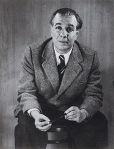Argentina declared its independence from Spain on July 9, 1816. Pope Francis and soccer player Lionel Messi call the South American country home. The country boasts a romantic image (the tango) and a tumultuous history (the Dirty War, when thousands of young Argentines disappeared in the 1970s) that makes it perfect fodder for its writers. (Face palm. I somehow forgot about Julio Cortázar when I first wrote this. Here’s his profile.)
 • Jorge Luis Borges (1899-1986) has become one of the most beloved writers of all time thanks to his short stories, which are collected in the books The Aleph and Ficciones. He won the Cervantes Prize, one of the most prestigious awards given to Spanish-language writers. Another Cervantes winner, Adolfo Bioy Casares (1914-1999), wrote the science fiction novel, The Invention of Moral, which was called “perfect” by Borges, a frequent collaborator.
• Jorge Luis Borges (1899-1986) has become one of the most beloved writers of all time thanks to his short stories, which are collected in the books The Aleph and Ficciones. He won the Cervantes Prize, one of the most prestigious awards given to Spanish-language writers. Another Cervantes winner, Adolfo Bioy Casares (1914-1999), wrote the science fiction novel, The Invention of Moral, which was called “perfect” by Borges, a frequent collaborator.
 • Other Cervantes honorees include Ernesto Sábato (1911-2011), left, who tackled psychological issues in books such as The Tunnel, and poet Juan Gelman, whose relatives who went missing during the Dirty War, inspiring his political activism. The Dirty War is the focus of Carolina DeRobertis’ novel Perla.
• Other Cervantes honorees include Ernesto Sábato (1911-2011), left, who tackled psychological issues in books such as The Tunnel, and poet Juan Gelman, whose relatives who went missing during the Dirty War, inspiring his political activism. The Dirty War is the focus of Carolina DeRobertis’ novel Perla.
 • Manuel Puig (1932-1990) wrote one of Latino literature’s most famous works – the 1976 novel Kiss of the Spider Woman, about a gay man and a revolutionary who are trapped in prison together. The novel became a play, a popular Oscar-winning 1985 movie and Broadway musical. He also wrote 1968’s Betrayed by Rita Hayworth and 1973’s The Buenos Aires Affair.
• Manuel Puig (1932-1990) wrote one of Latino literature’s most famous works – the 1976 novel Kiss of the Spider Woman, about a gay man and a revolutionary who are trapped in prison together. The novel became a play, a popular Oscar-winning 1985 movie and Broadway musical. He also wrote 1968’s Betrayed by Rita Hayworth and 1973’s The Buenos Aires Affair.
 • Winners of the Rómulo Gallegos International Novel Prize, one of Latin America’s most prestigious literary awards, are Abel Posse for Los perros del paraíso; Mempo Giardinelli, left, for Santo oficio de la memoria; and Ricardo Piglia, for Blanco nocturno.
• Winners of the Rómulo Gallegos International Novel Prize, one of Latin America’s most prestigious literary awards, are Abel Posse for Los perros del paraíso; Mempo Giardinelli, left, for Santo oficio de la memoria; and Ricardo Piglia, for Blanco nocturno.
 • Other writers with Argentine roots include Julia Amante, right, author of Say You’ll Be Mine; Annamaria Alfari, whose latest novel, Blood Tango, features Argentina’s most famous political couple, Juan and Eva Peron; quirky novelist César Aira; and Sonia Nazario, Pulitzer Prize winner author of Enrique’s Journey.
• Other writers with Argentine roots include Julia Amante, right, author of Say You’ll Be Mine; Annamaria Alfari, whose latest novel, Blood Tango, features Argentina’s most famous political couple, Juan and Eva Peron; quirky novelist César Aira; and Sonia Nazario, Pulitzer Prize winner author of Enrique’s Journey.
Sources: Britannica.com, Wikipedia. Hat tip for Joy Castro for the Borges quote on Casares.
